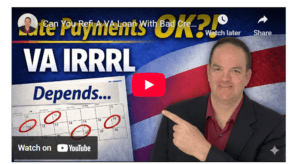
Can You Have Multiple Properties With A Single VA Loan?
Can You Have Multiple Properties With A Single VA Loan? You’re trying to buy a property and it includes more than one parcel or lot
Carlos Scarpero- Mortgage Broker
The VA home loan has no minimum credit score requirement. This means that technically, you can qualify for a VA loan regardless of your credit score. However, that does not mean every lender will approve you, as they often have their own additional requirements known as lender overlays.
Lender overlays are additional rules or standards that lenders impose beyond what the VA requires. While the VA itself doesn't have a minimum credit score, it does have minimum standards for approval. Some lenders choose to be more strict and add their own criteria on top of VA guidelines, and these additional requirements are called lender overlays.
Absolutely. The VA home loan program is extremely flexible, and manual underwriting allows you to tell your story and demonstrate why you are a good credit risk. Automated underwriting systems might not capture the full picture of your financial situation, but manual underwriting can show things like extenuating circumstances or positive payment history that systems might miss. Many times, this approach leads to approvals in situations where automated systems might deny.
Extenuating circumstances generally refer to specific hardships like medical issues, job loss, or difficulty selling a previous home. These situations are important because if you had late payments in the past year due to these reasons, the VA and lenders might waive certain waiting periods. Usually, lenders will look at your payment history over the past year to evaluate these circumstances. If the late payments are related to verified extenuating circumstances and have since been resolved, it can help you get approved.
The VA mainly focuses on mortgage late payments rather than collections or charge-offs. However, virtually every lender will examine collections and charge-offs from the past year. If you have recent late payments on collections or charge-offs, approval becomes more difficult unless you have a significant extenuating circumstance. Medical collections are often excluded by most lenders.
In theory, yes. Some lenders will approve a VA loan with a credit score as low as 500. However, the challenge is that borrowers with scores under 550 often have recent late payments, which makes approval more difficult. While it’s possible, the situation requires careful underwriting and often the presence of extenuating circumstances. If you have questions or want help, it’s best to consult a knowledgeable loan officer.
Credit scores you see on consumer websites like Credit Karma don’t always match the scores lenders use. Also, credit score is only one part of the approval process. Lenders look at payment history, debt-to-income ratios, residual income, and other factors. If you have a credit score above 580 but were declined, it’s usually due to something in your payment history or debt ratios rather than the score alone.
Big mortgage lenders like Rocket Mortgage and Veterans United typically have minimum credit score requirements that range from about 580 to 620. These companies often change their rules, but generally, if your score is below this range, you may struggle to get approval from these big-name lenders. However, these requirements don’t mean you can’t qualify elsewhere, especially through brokers who work with multiple lenders.
I’m a bit biased, but I recommend going through a mortgage broker if you have low credit scores. Each lender has different overlays and requirements, so having access to multiple lenders increases your chances of approval. Brokers can match you with lenders who are flexible enough to work with credit scores at the very base of VA guidelines, especially when your credit situation is more specialized.
It depends on the type and age of the collections. New collections generally disqualify you unless there are extenuating circumstances. Medical collections are usually excluded by most lenders and do not affect approval. However, credit card or installment loan collections within the past year require a valid extenuating circumstance to be considered for approval.
Whether charge-offs are acceptable depends on when they occurred. If a charge-off is over a year old, lenders are often willing to overlook it. Recent charge-offs, especially within the last year, are more problematic and usually require extenuating circumstances and explanations to be approved.
It depends on the type of bankruptcy. For Chapter 7 bankruptcies, there is typically a two-year waiting period before you can qualify for a VA loan, although this can sometimes be reduced to one year with extenuating circumstances. For Chapter 13 bankruptcies, the waiting period is generally one year from the filing date, provided you have been making your payments as required. Proper documentation and explanations are essential in these cases.
Foreclosure generally requires a two-year waiting period before you can qualify for a VA loan. Foreclosures affect your entitlement, which may impact how much you can borrow with zero down payment. However, it’s possible to settle foreclosures to restore your entitlement, allowing you to apply for a VA loan again. I have detailed videos about bankruptcy and foreclosure for those interested.
Paying off collections doesn’t immediately improve your credit score or guarantee loan approval. The negative payment history remains on your credit report and continues to impact your credit score. For recent collections, I recommend credit repair services that offer “pay per delete” agreements, where the collection agency agrees to remove the collection from your credit report after payment. This approach is much more effective than simply paying off the debt.
Payment shock occurs when your new mortgage payment is significantly higher than your current rent. This can be a concern during manual underwriting because lenders look closely at your cash flow. Some lenders are more flexible with payment shock than others. As a broker, I can identify which lenders are more lenient on this issue to find the best fit for you.
It depends on whether the late payments occurred while you were still married or after the divorce. If the late payments happened during the marriage, they are considered contingent liabilities, meaning they can count against you. If the late payments occurred after the divorce, in many cases, we can exclude those payments and even remove that history from your credit evaluation, provided we can show a good payment history since then. This is a nuanced area that many loan officers aren’t aware of.
For VA loans, putting a large down payment does not necessarily improve your chances of approval because the VA program has specific credit requirements. However, if you consider alternative loan programs, putting a large down payment can increase flexibility and improve approval odds. Gift funds from family are often used in these situations. But for VA loans specifically, the credit standards remain more selective.
Yes and no. A cosigner can help boost your qualifying income if you have a low income, but they cannot be used to offset bad credit. For example, if you have a credit score of 500, having a cosigner with a higher score will not remove the impact of your low score. The lender will consider the lower credit score in the approval process. Cosigners are more useful for income purposes than credit repair.
Absolutely. VA loans are the most flexible mortgage program available, especially for veterans. They are easier to get approved for compared to FHA loans. The VA program is designed to help veterans succeed in homeownership, and its flexibility reflects that mission.
Definitely. VA loans are far easier to get approved for than conventional loans. It surprises me how many realtors push veterans toward conventional financing when VA loans offer the most flexibility and benefits. The VA loan program is unmatched in terms of approval ease and borrower protections.
Yes, it’s possible to get approved for a VA loan with no traditional credit history. We use alternative trade lines to evaluate your financial reliability. This means you can qualify even if you don’t have a conventional credit score, by showing other evidence of your creditworthiness.
No, defaulted student loans are not acceptable. They are reported to a federal system called CAVRS, which flags them as defaults. To qualify for a VA loan, you must have the student loans settled or at least be current on payments under a payment plan. The loans must be out of default for approval.
Delinquent income taxes are not okay. You will need to settle any unpaid taxes before you can qualify for a VA loan. This is a strict requirement because unpaid taxes represent a significant financial liability.
No, judgments are not acceptable. They must be resolved and settled before approval. Like delinquent taxes, judgments represent liabilities that lenders cannot overlook.

Can You Have Multiple Properties With A Single VA Loan? You’re trying to buy a property and it includes more than one parcel or lot

How To Get A VA Loan When You Work On Commission If you earn commission instead of a steady salary, qualifying for a VA loan

Can You Refi a VA Loan With Bad Credit? If you have a VA loan and a low credit score, you might assume refinancing is